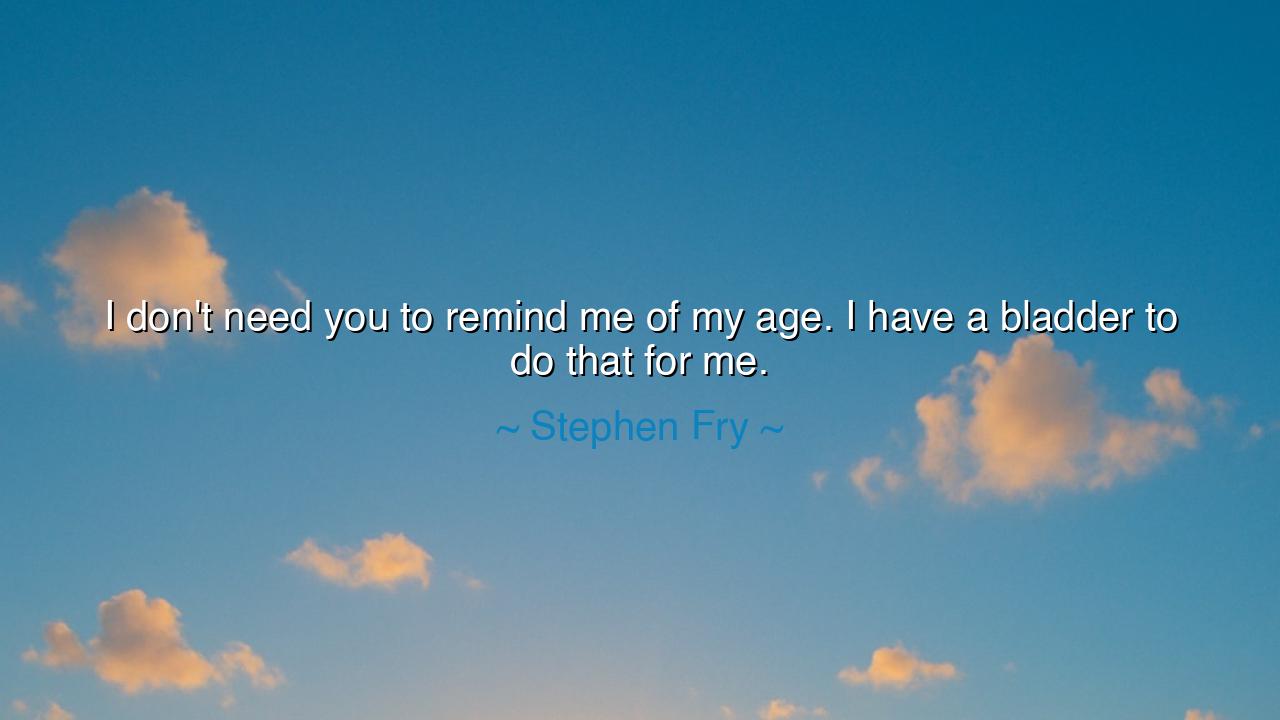
I don't need you to remind me of my age. I have a bladder to do






"I don't need you to remind me of my age. I have a bladder to do that for me." These words, spoken by the witty and insightful Stephen Fry, cut through the discomfort and inevitable humor of aging with sharp self-awareness. Fry’s remark is not only an amusing acknowledgment of the physical realities of growing older but also a defiant declaration that we do not need to be reminded of our age by others, as the body itself will inevitably make it known. The bladder, as Fry suggests, serves as a constant reminder of the passage of time—one of the most unglamorous yet universal aspects of aging. What Fry beautifully encapsulates is the inevitability of aging, and the humor and grace with which one can confront this aspect of life, rather than allowing it to weigh down the spirit.
In the ancient world, aging was viewed as a transition, an inevitable process, but also one that brought with it a deepening of wisdom. The Greek philosopher Socrates, though he was often concerned with the state of the soul, also recognized that physical decline was a natural part of the human experience. Yet he was never defined by his age, for it was his mind—his endless pursuit of truth and knowledge—that defined his legacy. Fry’s words suggest that the body may betray us with the physical markers of age—aches, fatigue, and even the inconvenience of a bladder that demands our attention. But these are mere reminders, not definitions of our worth. It is the mind, the spirit, and the attitude that determine how we engage with the world, regardless of the number of years we have lived.
Consider the life of Benjamin Franklin, whose wit, like Fry’s, helped him navigate the challenges of growing older. Despite his advanced years, Franklin continued to be a force for change and innovation. He faced the physical burdens of age—his eyesight failing, his joints growing stiff—but he was never deterred in his intellectual pursuits or his contributions to society. In a way, Franklin embodied the spirit of Fry’s words: even as the body becomes more difficult to manage, the mind and spirit are capable of great feats. The challenges of aging may make themselves known in the most inconvenient ways, but Franklin and Fry both remind us that they need not define our purpose or our legacy.
Fry’s wit is a powerful tool in this fight against the tyranny of age. He uses humor to disarm the tension that often accompanies the aging process. In the ancient Roman tradition, Cicero spoke of the need for grace in old age. Though he acknowledged the physical decline that comes with age, he also emphasized that the mind could remain as sharp as ever. Cicero didn’t dwell on the body’s weaknesses; instead, he celebrated the opportunity for philosophical reflection, growth, and understanding that old age brings. Fry mirrors this sentiment with his humor—by laughing at the inevitable, we can deflate its power and retain our sense of joy and purpose, even in the face of the bodily reminders of aging.
In the world of Socrates, Cicero, and Franklin, the soul and mind were paramount. Yet, like Fry, they too were aware of the body’s decline. But they did not let their physical limitations define them. The story of Leonardo da Vinci serves as a powerful example of this. Even in his later years, da Vinci remained passionate about learning and creating, constantly exploring new fields of study. His body weakened, but his curiosity and creativity never ceased. Fry’s humor and da Vinci’s resilience speak to the same truth: that while we may face physical challenges, they are not the sum total of who we are or what we can achieve.
Let us, then, take Fry’s playful wisdom to heart. The bladder may remind us of our age, but it does not have to remind us of our limitations. Aging is inevitable, but the attitude with which we face it is ours to choose. Fry teaches us that instead of lamenting the physical burdens of growing older, we can choose to meet them with humor, grace, and a recognition that the mind and spirit are where true vitality lies. Aging is not a cause for despair but a call to embrace the fullness of life, to remain curious, creative, and full of purpose, regardless of the years behind us.
So, O children of wisdom, let this be your lesson: age may bring the physical reminders—aches, fatigue, and even the inconvenient bladder. But the mind and spirit can remain as youthful as ever, if only we approach them with the same joy and curiosity we had in our youth. Let humor be your shield against the weight of time, and let the mind be your guide, for it is through learning, growing, and creating that we continue to live fully. Fry’s words remind us that while the body may age, the essence of who we are—the core of our being—remains marvellous, no matter how many years pass.






AAdministratorAdministrator
Welcome, honored guests. Please leave a comment, we will respond soon